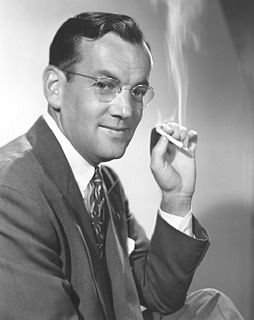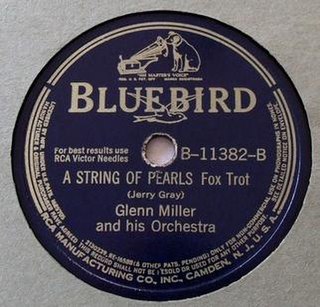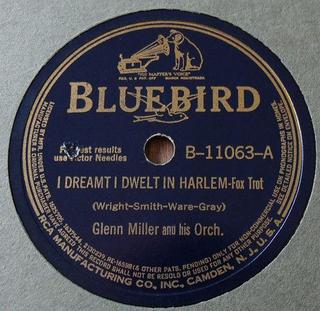

"To You" is a 1939 song composed by Tommy Dorsey with Benny Davis and Ted Shapiro. The song was a top 10 hit on the Billboard charts.


"To You" is a 1939 song composed by Tommy Dorsey with Benny Davis and Ted Shapiro. The song was a top 10 hit on the Billboard charts.
"To You" was recorded by Glenn Miller and His Orchestra with vocals by Ray Eberle and released as an RCA Bluebird 78. Glenn Miller also performed the song at the 1939 Carnegie Hall Concert, which was released in 1958 by RCA Victor on the album The Glenn Miller Carnegie Hall Concert . "To You" appeared as part of a medley by Glenn Miller and his Orchestra, paired with "Stairway to the Stars", both sung by Ray Eberle at the live performance at Carnegie Hall on October 6, 1939. [1] Glenn Miller recorded "To You" for Bluebird records on May 9, 1939 released as Bluebird 10276-B, with the "A" side, "Stairway To The Stars" both sung by Ray Eberle. [2] Ella Fitzgerald and Paul Whiteman also recorded the song with Joan Edwards on vocals. The song was featured by Harry Richman in the International Casino Revue Hello Beautiful in 1939.
Harry James recorded the song with Frank Sinatra on vocals.
Tommy Dorsey and his Orchestra released the song as an A side RCA Victor 78 single in 1939, 26234-A. According to the tsort.info database, "To You" reached no. 10 on the Billboard chart, staying on the chart for 7 weeks. [3]

Thomas Francis Dorsey Jr. was an American jazz trombonist, composer, conductor and bandleader of the big band era. He was known as the "Sentimental Gentleman of Swing" because of his smooth-toned trombone playing. His theme song was "I'm Getting Sentimental Over You". His technical skill on the trombone gave him renown among other musicians. He was the younger brother of bandleader Jimmy Dorsey. After Dorsey broke with his brother in the mid-1930s, he led an extremely popular and highly successful band from the late 1930s into the 1950s. He is best remembered for standards such as "Opus One", "Song of India", "Marie", "On Treasure Island", and his biggest hit single, "I'll Never Smile Again".

Glenn Miller and His Orchestra was an American swing dance band formed by Glenn Miller in 1938. Arranged around a clarinet and tenor saxophone playing melody, and three other saxophones playing harmony, the band became the most popular and commercially successful dance orchestra of the swing era and one of the greatest singles charting acts of the 20th century.

Gordon Lee "Tex" Beneke was an American saxophonist, singer, and bandleader. His career is a history of associations with bandleader Glenn Miller and former musicians and singers who worked with Miller. His band is also associated with the careers of Eydie Gormé, Henry Mancini and Ronnie Deauville. Beneke also solos on the recording the Glenn Miller Orchestra made of their popular song "In The Mood" and sings on another popular Glenn Miller recording, "Chattanooga Choo Choo". Jazz critic Will Friedwald considers Beneke to be one of the major blues singers who sang with the big bands of the early 1940s.

"It Happened in Sun Valley" is a 1941 song composed by Harry Warren, with lyrics by Mack Gordon. It was recorded and featured by Glenn Miller and his orchestra in the movie Sun Valley Serenade.
Irving "Babe" Russin was a tenor saxophone player.

"Moonlight Serenade" is an American swing ballad composed by Glenn Miller with subsequent lyrics by Mitchell Parish. It was an immediate phenomenon when released in May 1939 as an instrumental arrangement, though it had been adopted and performed as Miller's signature tune as early as 1938, even before it had been given the name "Moonlight Serenade." In 1991, Miller's recording of "Moonlight Serenade" was inducted into the Grammy Hall of Fame.

Ernesto Caceres was an American jazz saxophonist born in Rockport, Texas. He was a member of the Glenn Miller Orchestra from 1940–1942.

Between 1938 and 1944, Glenn Miller and His Orchestra released 266 singles on the monaural ten-inch shellac 78 rpm format. Their studio output comprised a variety of musical styles inside of the Swing genre, including ballads, band chants, dance instrumentals, novelty tracks, songs adapted from motion pictures, and, as the Second World War approached, patriotic music.

"Sunrise Serenade" is a jazz song written by Frankie Carle with lyrics by Jack Lawrence. It was first recorded in 1939 by Glen Gray and the Casa Loma Orchestra with Carle on piano as Decca 2321. It soon became Carle's signature piece. Glenn Miller released a famous recording of it a few months later, arranged by Bill Finnegan, with "Moonlight Serenade" on the backside.

"A String of Pearls" is a 1941 song composed by Jerry Gray with lyrics by Eddie DeLange. It was notably recorded by Glenn Miller and His Orchestra on RCA Bluebird that November, becoming a #1 hit. The song is a big band and jazz standard.

"Sold American" is a 1938 song composed by Glenn Miller with John Chalmers "Chummy" MacGregor and recorded for both Brunswick and RCA Bluebird.

Sometime is a 1939 song composed by Glenn Miller, Chummy MacGregor, and Mitchell Parish and performed for radio broadcast only. The song was never recorded in the studio but was performed live for remote radio broadcast on the Mutual and Blue Network from the Meadowbrook Ballroom in Cedar Grove, New Jersey.

"I Dreamt I Dwelt in Harlem" is a 1941 jazz and pop song recorded by Glenn Miller and His Orchestra. The song was released as a 78 single on RCA Bluebird by Glenn Miller.

"Pennsylvania 6-5000" is a 1940 swing jazz and pop standard with music by Jerry Gray and lyrics by Carl Sigman. It was recorded by Glenn Miller and His Orchestra as a Bluebird 78 rpm single.

"I Know Why " is a 1941 song by Glenn Miller and His Orchestra. The song appeared in the 20th Century Fox movie Sun Valley Serenade. The song was also released as an RCA Bluebird 78 single.

"Elmer's Tune" is a 1941 big band and jazz standard written by Elmer Albrecht, Dick Jurgens and Sammy Gallop. Glenn Miller and his Orchestra and Dick Jurgens and his Orchestra both charted with recordings of the composition.
"Crosstown" is a 1940 song recorded by Glenn Miller and His Orchestra. The song was written by James Cavanaugh, John Redmond, and Nat Simon.

"Tomorrow's Another Day" is a 1935 song composed by Glenn Miller for the Dorsey Brothers Orchestra. The song was released as a 78 single by the Dorsey Brothers Orchestra on Decca Records.

"Harlem Chapel Chimes" is a 1935 jazz instrumental composed by Glenn Miller. The song was released as an A-side 78 single by the Dorsey Brothers Orchestra.

The Glenn Miller Carnegie Hall Concert is a live album by Glenn Miller and his Orchestra. It documents a live concert recorded in Carnegie Hall in 1939. The album was released by RCA Victor in 1958.
| | This 1930s song article is a stub. You can help Wikipedia by expanding it. |
| | This article about a jazz standard or composition written in the 1930s is a stub. You can help Wikipedia by expanding it. |